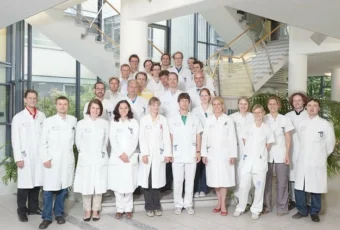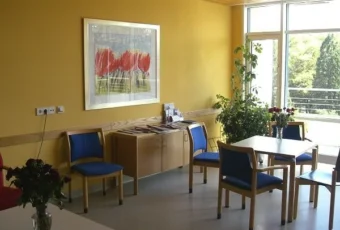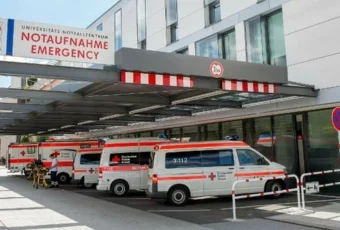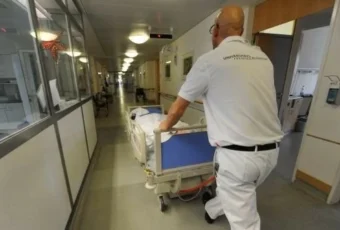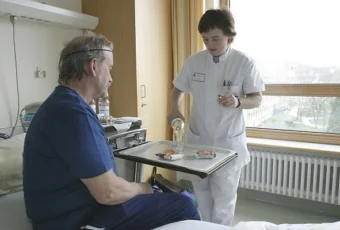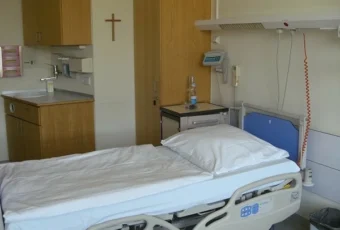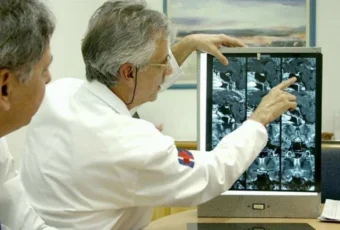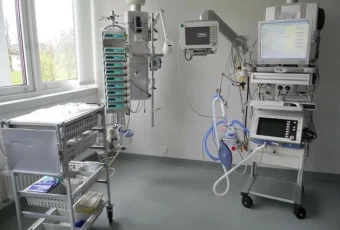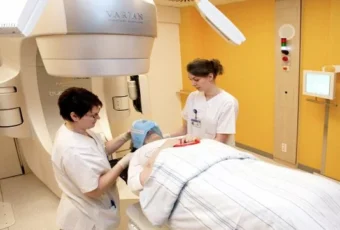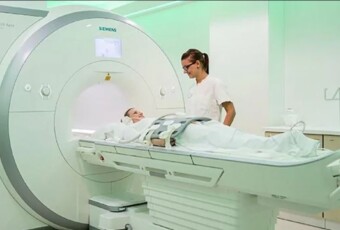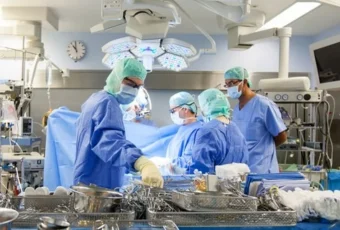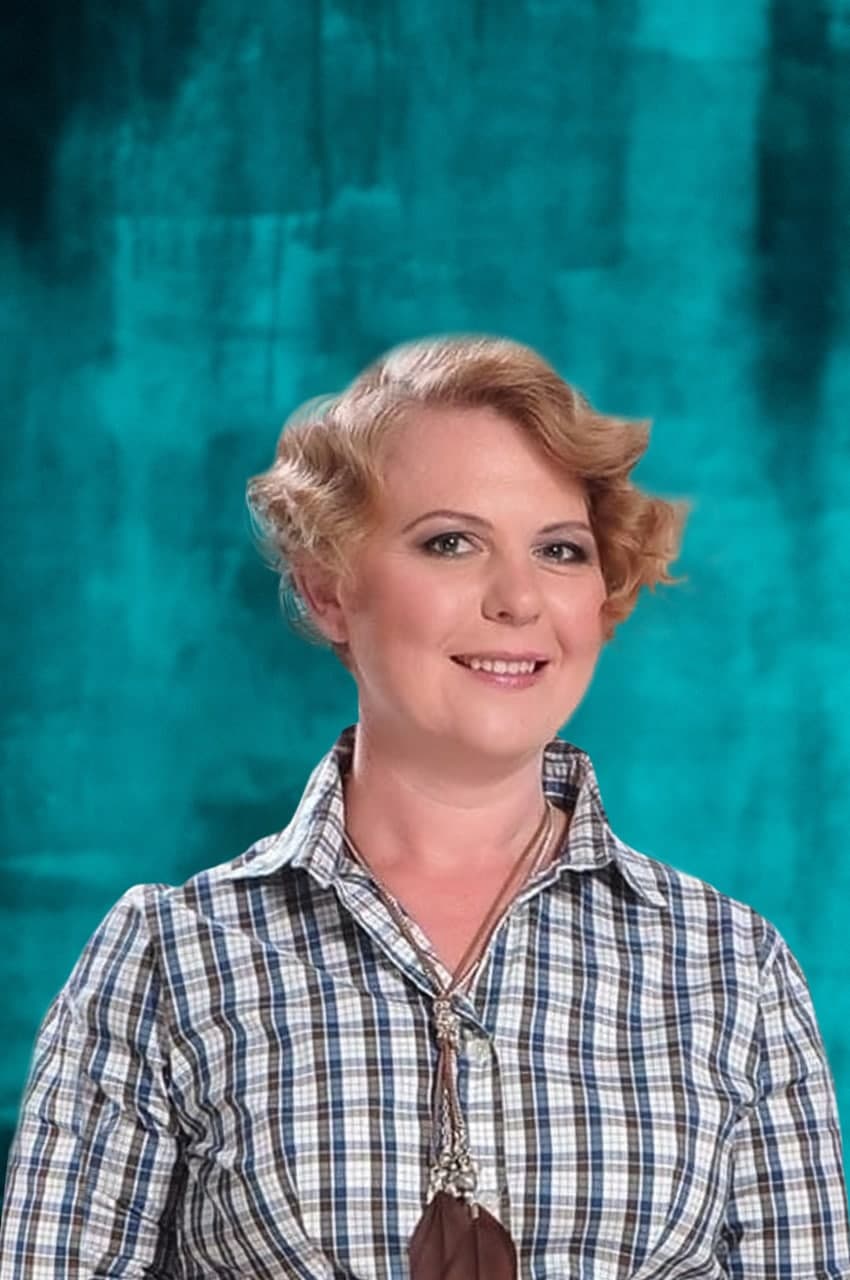

Freiburg University Hospital is one of the leading public medical institutions in Germany. It specializes in the treatment of cancer, epilepsy, stroke, chronic immunodeficiency, cardiac surgery, and neurosurgery.
The hospital is one of the three leading hospitals in Germany. The Focus edition included Uniklinik Freiburg in the TOP-5 clinics in Europe in 2015. The medical center serves as a scientific base for research and development in various fields. For example, diagnostics and treatment of oncological diseases, transplantology, surgical treatment of brain diseases, and new MRI systems.
Uniklinik Freiburg is controlled by the German Ministry of Health. Among the doctors are the world's leading experts in various fields of medicine. The hospital is located in the small town of Freiburg.
Main Specializations of Freiburg Hospital
The hospital provides medical care in all areas, among which it is necessary to highlight:
- oncology;
- oncohematology;
- ophthalmology;
- neurology;
- neurosurgery;
- cardiology and cardiac surgery;
- general and visceral surgery;
- orthopedics and traumatology.
On the basis of Uniclinik Freiburg, the Freiburg Cancer Center (CCCF) operates, which is one of the TOP-4 leading cancer treatment centers in the country. It repeatedly received the title of “Leading Cancer Center in Germany”. It is recognized as the best in the country in the treatment of brain tumors, leukemia, myeloma, lung and liver metastases, and tumors of the female organs.
Comprehensive Approach to Treatment at Freiburg Hospital
Treatment at Uniklinik Freiburg is based on an interdisciplinary and personalized approach. A treatment plan for each patient is developed by doctors of different specializations, taking into account the peculiarities of the diagnosis and the state of human health. Treatment programs are designed in such a way that the methods chosen by doctors have the maximum result.
For foreign patients in the hospital, there is an opportunity to receive a consultation from the chosen doctor via telemedicine regarding the diagnosis or medical appointments in their country. Teleradiology (evaluation by doctors of x-rays, MRI, CT, and the preparation of a written opinion) is also in demand.
State-of-the-art Technology at Freiburg Hospital
At Uniklinik Freiburg, treatment is based on evidence-based medicine, taking into account current scientific developments.
Some of the best practices:
- Bone marrow and stem cell transplantation for the treatment of cancer and autoimmune diseases. More than 200 successful transplantations are performed here annually.
- CAR-T-cell therapy is an innovative technique in the treatment of uncontrolled lymphoma and leukemia, aimed at the immune response against cancer cells.
- Radiation therapy with ionizing radiation.
- Immunotherapy. This is a cancer treatment technique that uses drugs derived from living organisms. They help the human body fight only cancer cells and increase the resistance of the immune system.
- Hormone therapy for cancer of the breast, prostate, ovaries, and uterus.
- Neurosurgical minimally invasive interventions using neuronavigation and 3D ultrasound, thanks to which the surgeon completely and safely removes brain tumors.
- Deep brain stimulation and implantation of a vagus nerve stimulator in the treatment of epilepsy, Parkinson's disease.
- Blepharoplasty is used to change the shape of the eyes.
- Endovascular innovative technologies for the treatment of vascular malformations.
- Operations on a beating heart (without connection to a ventilator).
- Operations to eliminate congenital heart defects using AMPLATZER technology.
- Transcatheter aortic valve replacement (TAVI).
- A unique algorithm for the intensive care of stroke patients has been developed.
- Hyperthermic intraperitoneal chemotherapy (HIPEC) is a topical chemotherapy for treating cancerous lesions in the abdominal cavity.
- Laser cataract surgery with the installation of intraocular lenses of the latest model.
- The Whipple operation for pancreatic cancer is one of the most complex surgical procedures.
- Laparoscopic interventions in pancreatic surgery.
- The use of fibro-tests for accurate diagnosis of liver diseases.
- Transjugular intrahepatic portosystemic shunting (TIPS) is a minimally invasive endovascular procedure for liver cirrhosis.
- Microsurgical decompression of the spine is an operation to remove tissues that compress the neurovascular structures of the spinal canal.
- Electroresection for prostate adenoma.
- Fast-Track Accelerated Rehabilitation Surgery.
According to Uniklinik Freiburg, over 98% of patients treated here recommend this hospital.
Conditions for foreign patients at Freiburg Hospital
Uniklinik Freiburg offers patients a high level of comfort and service. The range of services includes:
accommodation in comfortable rooms equipped with a call button for medical staff
- accommodation in comfortable wards equipped with a button to call the medical staff;
- accommodation of accompanying persons;
- transfer from the airport.
Experts Medical coordinators will help you quickly and reliably select a specialist, organize a consultation with him, and prepare a trip to Freiburg University Hospital.
Cardiosurgery
Dentistry
Dermatology
Gatroenterology
Neurology
Neurosurgery
Obstetrics & gynecology
Oncology
Ophtalmology
Psychiatry
Surgery
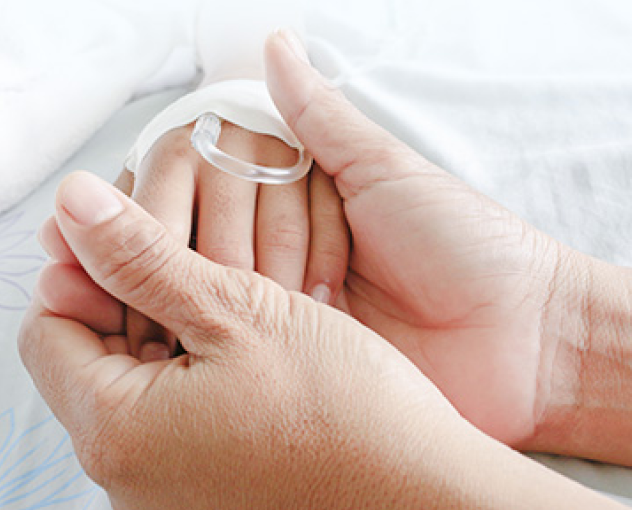
| Medical consultation | 200 - 400 $ | Enquire price |
| Online second opinion | 370 $ | Enquire price |
| PET CT | 2 100 - 3 500 $ | Enquire price |
| Angiography | 5 000 - 6 500 $ | Enquire price |
| MRI | 800 - 1 500 $ | Enquire price |
| CT with contrast | 600 - 1 000 $ | Enquire price |
| Laboratory analysis | 50 - 1 000 $ | Enquire price |
| Histology review | 300 - 1 000 $ | Enquire price |
| Cyber knife ( radiotherapy) | 9 000 - 13 000 $ | Enquire price |
| Chemotherapy | 9 500 - 15 300 $ | Enquire price |
| Tumor biopsy | 7 500 - 12 000 $ | Enquire price |
| Histology review | 300 - 1 000 $ | Enquire price |
| MIBG | 4 000 - 5 500 $ | Enquire price |
| PET CT | 2 100 - 3 500 $ | Enquire price |
| Mastectomy | 12 000 - 14 800 $ | Enquire price |
| Immunotherapy | 60 000 - 256 000 $ | Enquire price |
| Cervical tumor removal | 12 000 - 18 000 $ | Enquire price |
| Transurethral resection of the prostate | 12 000 - 17 500 $ | Enquire price |
| Allogeneic bone marrow transplantation (related donor) | 195 000 - 271 000 $ | Enquire price |
| Bone marrow biopsy | 5 000 - 7 500 $ | Enquire price |
| PET CT | 2 100 - 3 500 $ | Enquire price |
| Cardiologist consultation | 380 $ | Enquire price |
| Angiography | 3 800 - 6 700 $ | Enquire price |
| Coronary stenting | 15 000 - 18 300 $ | Enquire price |
| Coronary bypass | 21 000 - 24 000 $ | Enquire price |
| Heart valve replacement | 23 200 - 26 700 $ | Enquire price |
| Heart MRI | 800 - 1 500 $ | Enquire price |
| Surgical treatment of intervertebral hernia | 15 300 - 17 500 $ | Enquire price |
| Brain MRI | 800 - 1 500 $ | Enquire price |
| Brain tumor removal | 23 300 - 27 500 $ | Enquire price |
| Lumbar discectomy | 10 500 - 14 130 $ | Enquire price |
| Lens replacement (cataract treatment) | 5 300 - 7 500 $ | Enquire price |
| Keratoplasty (corneal transplant) | 8 300 - 9 400 $ | Enquire price |
| Crosslinking for 1 eye | 7 300 - 8 200 $ | Enquire price |
| I Lasik (2 eyes) | 4 200 - 5 500 $ | Enquire price |
| PRK Photorefractive keratectomy (2 eyes) | 4 800 - 5 500 $ | Enquire price |
| Complete diagnosis of epilepsy and conservative treatment | 8 200 - 9 300 $ | Enquire price |
| Deep brain stimulation | 20 000 - 28 000 $ | Enquire price |
| Diagnostika i konservativnoye lecheniye rasseyanogo skleroza Возможно, вы имели в виду: Диагностика и консервативное лечение рассеянного склероза 56/5000 Diagnosis and conservative treatment of multiple sclerosis | 2 300 - 3 900 $ | Enquire price |
| Diagnosis of Parkinson's disease | 2 100 - 3 600 $ | Enquire price |
He leads a research group that studies signaling pathways in leukemia oncogenes. He repeatedly delivered scientific reports at symposia of world significance.
A member of many global medical communities, he repeatedly spoke at medical conferences. More than 250 of his works were published in leading scientific journals. He is the co-author of textbooks in otolaryngology, engaged in teaching and research activities.
Author of numerous publications on the problems of the occurrence, diagnosis, development, and treatment of epilepsy. Professor holds the post of head of the leading German epileptic center, located in Freiburg.
Member of the European Society of Radiology, member of the German Academy of Education and Learning of Radiology. He has 68 scientific publications and 250 talks at medical conferences.
Grant, German Society of Surgery (1998); Brompton Award, European Society of Thoracic Surgeons (2001) and others. Membership: European Society of Thoracic Surgeons; International Association for the Study of Lung Cancer (IASLC); Chairman of the European Union of Thoracic Surgeons (ESTS); Thoracic Journal Committee der ESTS; Chairman of the German Society of Thoracic Surgery.
Professor Doctor Jürgen Beck is a representative of the Department of Intracranial Pressure, Hydrocephalus and Cerebral Perfusion of the German Society of Neurosurgery DGNC. He is a reviewer of well-known international journals of neurosurgery, a reviewer of numerous scientific applications, and a lecturer at courses and lectures of the university.
Check the cost of treatment and get 20 000 € from international foundation
Get financial help up to 20 000 € for your child treatment
Medical consultant
Turkish oncologist will provide an individual chemotherapy program.
Israeli oncologist will provide an individual chemotherapy program.
Spanish oncologist will provide an individual chemotherapy program.
German oncologist will prepare an individual chemotherapy program.
Polish oncologist will prepare an individual chemotherapy program.
Italian oncologist will prepare an individual chemotherapy program.
Turkish radiologist will prepare a personalized radiation therapy program
Israeli radiologist will draw up an individual radiation therapy program.
German radiologist will draw up an individual radiation therapy program.
Spanish radiologist will draw up an individual radiation therapy program.
Polish radiologist will prepare an individual radiation therapy program.
Italian radiologist will draw up an individual radiation therapy program.
Turkish plastic surgeon will make an individual operation program.
German plastic surgeon will make an individual operation program.
Israeli plastic surgeon will make an individual operation program.
Italian plastic surgeon will make an individual operation program.
Polish plastic surgeon will make an individual operation program.
Spanish plastic surgeon will make an individual operation program.
Turkish orthopedic surgeon will make an individual operation program.
Israeli orthopedic surgeon will make an individual operation program.
German orthopedic surgeon will make an individual operation program.
Italian orthopedic surgeon will make an individual operation program.
Lithuanian orthopedic surgeon will make an individual operation program.
Polish orthopedic surgeon will make an individual operation program.
Ukrainian orthopedic surgeon will make an individual operation program.
Spanish orthopedic surgeon will make an individual operation program.
Turkish neurosurgeon will study the medical situation and give recommendations for treatment.
Israeli neurosurgeon will study the medical situation and give recommendations for treatment.
German neurosurgeon will study the medical situation and give recommendations for treatment.
Italian neurosurgeon will study the medical situation and give recommendations for treatment.
Lithuanian neurosurgeon will study the medical situation and give recommendations for treatment.
Spanish neurosurgeon will study the medical situation and give recommendations for treatment.
Ukrainian neurosurgeon will study the medical situation and give recommendations for treatment.
Turksih doctor will answer your questions
Israeli doctor will answer your questions
German doctor will answer your questions
Italian doctor will answer your questions
Polish doctor will answer your questions
Ukrainian doctor will answer your questions
Spanish doctor will answer your questions
Israeli orthopedic surgeon prepare an individual surgical plan and recomendations
Turkish orthopedic surgeon prepare an individual surgical plan and recomendations
German orthopedic surgeon prepare an individual surgical plan and recomendations
Italian orthopedic surgeon prepare an individual surgical plan and recomendations
Lithuanian orthopedic surgeon prepare an individual surgical plan and recomendations
Polish orthopedic surgeon prepare an individual surgical plan and recomendations
Spanish orthopedic surgeon prepare an individual surgical plan and recomendations
Lithuanian doctor will answer your questions
After examining your situation, doctor will make an individual price offer.
Doctor-consultant will answer all your questions about the cost of treatment, the choice of a doctor and fully organize treatment abroad.

we will contact you within 15 minutes
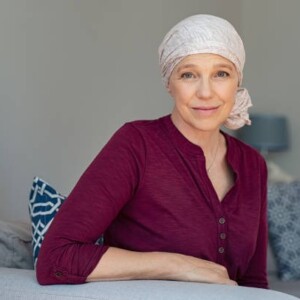 The Cancer Center of Uniklinik Freiburg is certified by the German Cancer Organization (DKFZ) as a top specialist center for the treatment of all types of cancer. The oncologists of Freiburg Hospital are highly qualified and provide patients with personalized treatment and support at all stages. The choice of therapy depends on the type, stage of the disease, the condition of the patient, and the possible risks and benefits of treatment.
The Cancer Center of Uniklinik Freiburg is certified by the German Cancer Organization (DKFZ) as a top specialist center for the treatment of all types of cancer. The oncologists of Freiburg Hospital are highly qualified and provide patients with personalized treatment and support at all stages. The choice of therapy depends on the type, stage of the disease, the condition of the patient, and the possible risks and benefits of treatment.
In addition to chemotherapy, a wide range of modern therapeutic technologies is available to foreign patients at Freiburg Hospital:
- Stereotactic radiation therapy (radiosurgery). Powerful beams are used for precise impact from different angles on small foci in the brain, lungs, and spine. It is carried out using the LINAC linear accelerator, which allows to accurately select the radiation load so as not to affect neighboring healthy tissues.
- Intensity Modulated Radiation Therapy (IMRT). The point effect of a large dose of radiation on the tumor. It is used for tumors in the head and neck, chest, and pelvic organs.
- Image Guided Radiation Therapy (IGRT). Before each irradiation session, computed tomography is performed. This enables oncologists to adjust the direction and dose of the rays, taking into account possible shifts or changes in the tumor. It is recommended for the treatment of cancer of the head and neck, lungs, liver, pancreas, and prostate.
- Intraoperative radiotherapy (IORT). Tumor irradiation during surgery using special applicators. It reduces the risk of spread of metastases or recurrence. It is used for tumors in the head and neck, skin, chest, intestines, pancreas, prostate, and cervix.
- Brachytherapy. This is contact radiation, in which the doctor injects a radioactive source inside near the tumor. It is indicated for cancer of the eye, breast, esophagus, pancreas, prostate, and cervix.
- Interstitial hyperthermia. Heating tissue around the tumor with microwave radiation up to 45°C. It is used to destroy tumors in the head and neck, mammary glands, soft tissues, and bones.
- Bone marrow transplantation (BMT). Transplantation of healthy stem cells to restore hematopoietic function. Stem cells are taken from the patient (autologous BMT) or from a donor (allogeneic BMT). It is an effective method for the treatment of leukemia, lymphomas, and myeloma. TCM can help the patient get rid of the disease and prevent recurrence.
- Immunotherapy. Drugs that activate the patient’s immune system to fight cancer cells are used. It is indicated in the presence of tumors that are resistant to other treatments or prone to metastasis. Immunotherapy is safer for the body than chemotherapy or radiation therapy, it does not damage healthy cells or organs. The different types of immunotherapy are used in University Hospital Freiburg:
- peripheral blood mononuclear cells (PBMC) are own or donor healthy immune cells after special treatment (performed after BMT or as an independent method for the treatment of leukemia, lymphomas);
- antibodies are special proteins that can recognize, block, and destroy cancer cells (effective in breast cancer, lymphoma, melanoma);
- cytokines are substances that regulate the activity of the immune system (used for kidney cancer, melanoma, leukemia).
- CAR-T-cell therapy. This is an innovative way to fight cancer. Doctors extract immune T-cells from a patient’s blood, modify them in the lab, and reinject them. Updated T-cells are aimed at recognizing and destroying cancerous foci. This method has the advantage of using the patient’s own cells, which reduces the risk of rejection and infection. The technology is recommended for the treatment of patients who do not respond to chemotherapy or TCM. According to clinical trials at Uniklinik Freiburg, CAR-T cell therapy can achieve complete remission in up to 90% of patients with leukemia and lymphoma.
According to a survey conducted at Freiburg Hospital, 97.1% of the interviewed patients recommend this oncology center.
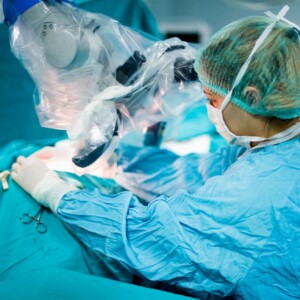 Uniklinik Freiburg is one of the leaders in the field of neurosurgery in Germany and throughout Europe. Scientific research is conducted and new methods of treating brain tumors are developed here.
Uniklinik Freiburg is one of the leaders in the field of neurosurgery in Germany and throughout Europe. Scientific research is conducted and new methods of treating brain tumors are developed here.
Foreign patients have the opportunity to participate in trials and be the first to receive effective treatment. Surgeons use computer navigation to avoid damage to the vital functions of the brain and shorten the rehabilitation period.
The main areas of work of the neuro-center at Freiburg University Hospital are:
- Deep brain stimulation (DBS). This is an effective method for the treatment of movement disorders in epilepsy, Parkinson’s disease, dystonia, and tremor. In certain areas of the brain, the doctor implants electrodes, which are then connected to a pulse generator. These impulses regulate the functioning of the brain and improve the condition of patients. According to Uniklinik Freiburg, DBS has improved the quality of life in more than 70% of patients.
- Interstitial radiosurgery. It allows the treatment of inoperable brain tumors. The surgeon injects radioactive grains (iodine-125) into the affected part of the brain, which irradiates and destroys cancer cells from the inside.
- Vascular neurosurgery. Microsurgical endovascular interventions are carried out to eliminate vascular pathologies of the brain: aneurysms, arteriovenous malformations, and fistulas. This helps prevent cerebral hemorrhage and its complications.
- Surgical treatment of hydrocephalus. Shunting is carried out – the installation of special tubes to remove excess fluid from the brain.
- Craniofacial operations. Methods of reconstructive and plastic surgery, including transplantation of bones, muscles, nerves, and skin are used.
According to statistics from Uniklinik Freiburg, the 5-year survival rate in patients with brain tumors exceeds 80%.
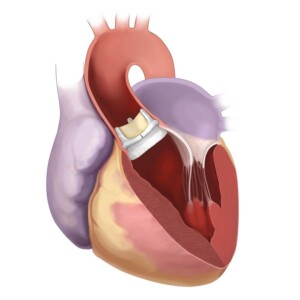 The Cardiac Surgery Center in Uniklinik Freiburg is one of the leading centers in Germany. All diseases of the heart and blood vessels are treated here for patients of any age, including newborns.
The Cardiac Surgery Center in Uniklinik Freiburg is one of the leading centers in Germany. All diseases of the heart and blood vessels are treated here for patients of any age, including newborns.
Most interventions are performed in a minimally invasive (through small incisions on the chest) and endovascular (catheter) method. These operations do not require opening the chest and stopping the heart. The occurrence of postoperative complications is minimized and patients recover quickly. Surgeons use special instruments, manipulations are performed under the control of x-rays or ultrasound.
Uniklinik Freiburg conducts the following procedures:
- Coronary revascularization. This is a coronary artery bypass, in which the surgeon creates bypasses to improve the blood supply to the heart.
- Transcatheter aortic valve implantation (TAVI) and mitral valve (TMVI). It is performed through a puncture in the femoral artery.
- Elimination of defects in the interatrial and interventricular septa using the AMPLATZER system. To close the holes in the walls of the heart, surgeons insert a special plug device through the catheter.
- Transcatheter coronary intervention (TCI) for the treatment of coronary heart disease.
Cardiac surgeons at Uniklinik Freiburg have extensive experience in open-heart surgery using a heart-lung machine. Foreign patients come for:
- installation of ventricular circulatory assist device. It is used for temporary or permanent replacement of heart function;
- treatment of congenital heart defects in children: transposition of the great vessels, tetralogy of Fallot, double discharge of the great vessels.
According to Uniklinik Freiburg, success rates are above the German average:
- interventions on the coronary arteries – 98.7%;
- heart valve surgery – 97.6%.
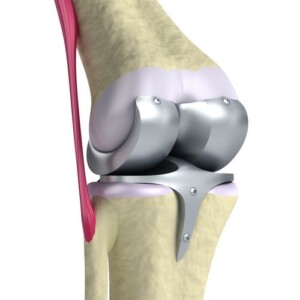 Among foreign patients, the following referrals to Uniklinik Freiburg are most in demand:
Among foreign patients, the following referrals to Uniklinik Freiburg are most in demand:
- Arthroscopy. This is a minimally invasive intervention for diagnostics and intra-articular operations through small skin punctures. This reduces the risk of infection, bleeding, pain, and shortens the recovery phase.
- Endoprosthetics. The replacement of the shoulder, elbow, hip, knee, and ankle joints is carried out using the navigation system. Modern Aesculap Bicontact cementless fixation prostheses and Metha short shaft prostheses are used in Uniklinik Freiburg. They restore joint function and improve the quality of life of patients.
- Spine surgery. Treatment of scoliosis, intervertebral discs, spondylolisthesis, spondylitis, and tumors is performed using sparing techniques. These include microsurgical, stabilizing, reconstructive, and decompression procedures.
- Tissue engineering. Orthopedic surgeons at Freiburg Hospital restore the functions of damaged cartilage, bone tissue, and ligamentous apparatus using biological substitutes.
- Treatment of osteoporosis. Doctors determine the degree of osteoporosis, and the risk of fractures, and also monitor the effectiveness of treatment using densitometry. It measures bone density using X-rays.
- Sports orthopedics and traumatology. Uniklinik Freiburg provides comprehensive assistance to athletes at all stages of treatment and rehabilitation.
Rehabilitation of patients takes place in specialized centers, with thermal springs and gyrotonic devices.
In 2020, the Orthopedics Center of Freiburg Hospital was included in the list of the best clinics for trauma surgery, orthopedics, and spinal surgery by Focus magazine.
To arrange a trip for treatment at Freiburg University Hospital, please contact the doctors-coordinators of Experts Medical.

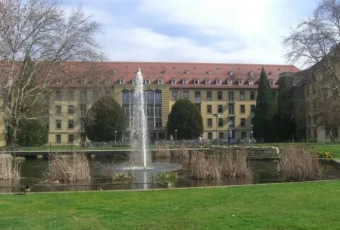
 show All photos
show All photos
